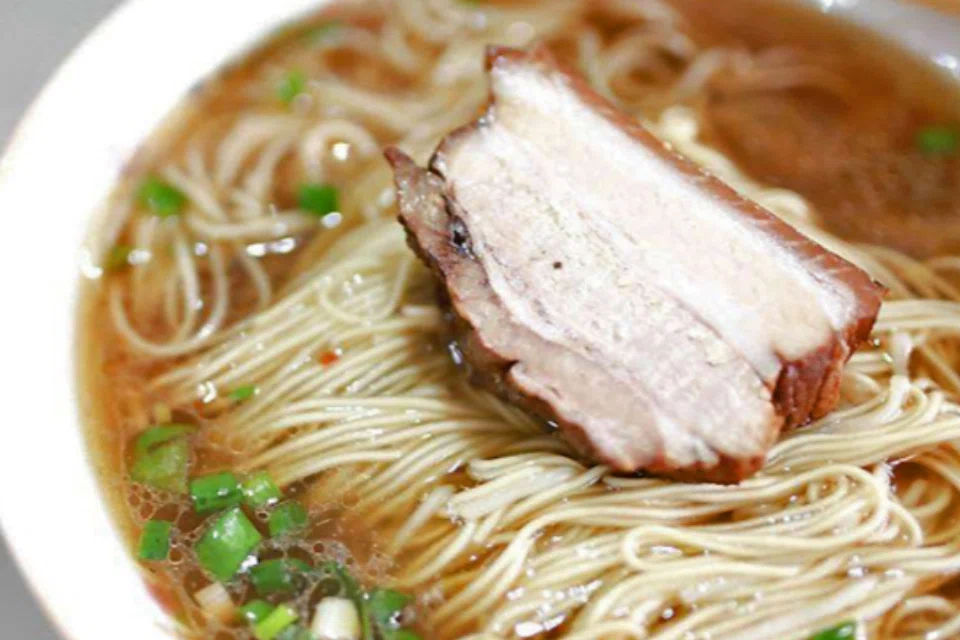Art and history in a bowl of Suzhou noodles
Cultural historian Cheng Pei-kai knows his bowl of Suzhou noodles. How is the toutangmian or head soup noodles connected to landscape poetry, Neo-Confucianism and Song dynasty music? And is it going to be the end of the world, if McDonald's were to sell Suzhou noodles? Prof Cheng shares his thoughts.

The Suzhou people love their noodles and expect to have it first thing in the morning. They're also extremely picky about it, fighting to be first in line to order a bowl of toutangmian (头汤面, lit. head soup noodles). As the name suggests, this toutangmian refers to the bowl of noodles cooked with the day's first pot of soup. If you're being serious about having a bowl of toutangmian that truly lives up to its name, you'll realise it's no mean feat: you'll have to be at the noodle house right when it's about to open, when neatly-dressed chefs have just reported to work and are boiling the first pot of water. You then place your order right at this moment, ordering either a bowl of clear broth noodles (白汤, lit. white soup) or meat stock noodles (红汤, lit. red soup), with a side dish of either stewed meat or Chinese yellow eel with shrimp as a topping for your noodles. Of course, if you'd prefer to order dried bamboo shoots with shredded meat, glazed pork, pickled vegetables with yellow croaker, Lion's Head (stewed meatballs) or stir-fried squid as your topping, feel free to do so too. The highlight of the dish is not the topping, but the bowl of noodles itself: it has to be al dente and springy, like cotton-white clouds peeking through the clear sky after a downpour, quietly and elegantly watching the day go by.
Nobody is like me - forever in a mad hunt for that particular bowl of noodles in a certain restaurant situated at some street, not resting until I find it. Isn't it just a bowl of noodles?
During my trips to Suzhou in recent years, I have been a loyal customer of the Tongdexing Noodle House at Shiquan Street. I adore their Fengqiao clear broth noodles that comes with a slice of stewed meat handsomely placed on top. The moment I take a bite, I feel a breath of fresh air, the kind that comes from deep within the mountains. It is akin to the landscape poetry written by the nobles of the Wei-Jin period: the mountains are mountains, waters are waters, forests are forests, chirping birds are chirping birds - everything is separate yet melds together in perfect harmony. Eating the bowl of noodles is the most peaceful and enjoyable thing on earth; it is a feeling comparable to reading a book on a lazy afternoon with the wind caressing your face - the waters are still and everything is at peace with one another.
Speaking to my Suzhou friends about Tongdexing, most of them were unwilling to visit, complaining about their steep prices. They grumble that for every bowl of noodles they buy at Tongdexing, they can buy two to three bowls elsewhere. Granted, they taste good, but this is not the way to live. If people who needed a daily noodle fix were to patronise Tongdexing every single day, would they have enough to go about their daily lives?

My friends made a good point: eating noodles is part of daily life. According to the Yangming School of Mind (a major philosophical school of Neo-Confucianism, based on the ideas of the idealist Neo-Confucian philosopher Wang Yangming of the Ming dynasty), this is referred to as "a commoner's daily need" - genuine and down to earth, with emphasis on unity between action and knowledge in relation to one's morality, and not being ostentatious or aggressive. The commoner leads a life of stability and modesty: when it's time to have noodles, eat them; when it's time to work, do it. When you're hungry, get your stomach filled; when you're tired, get some rest. Nobody is like me - forever in a mad hunt for that particular bowl of noodles in a certain restaurant situated at some street, not resting until I find it. Isn't it just a bowl of noodles?
I was chatting with a local Suzhou driver on my recent trip to Suzhou and of course, I had to talk about Suzhou noodles. He was in his fifties and grew up in Suzhou. He patiently listened to me go on about how any noodle house in the past was able to prepare good noodles, but only Tongdexing can do that now. He nodded his head in agreement, only to continue saying, "That's not entirely true, though." He recounted that people in the past were honest and stuck to the traditional ways of noodle making. Everything was exquisitely handmade and every strand of noodle was the culmination of the chef's lifetime of finesse. The legendary bowl of soup was also carefully boiled and simmered for at least six to eight hours using the finest ingredients. Who still needed artificial seasoning with soup of this quality? Even if you're not served authentic toutangmian, a bowl of noodles cooked in this manner would already be tastier than current chain noodle restaurants serving toutangmian. He's worried sick that if McDonald's were to also sell Suzhou noodles in the future, that'll be the end of the world for the Suzhou people. He told me that there's a noodle restaurant located at Shuyuan Alley that also uses the finest ingredients, serving noodles comparable to that of Tongdexing's but at half of its price. He gets his noodle fix there everyday.
The soup was clear, with a tinge of jade yellow, a colour resembling fine glass jadeites. It had a heavenly fragrance that was not too overpowering.
Early the next morning before the clock struck six, my wife and I excitedly rushed to the noodle restaurant at Shuyuan Alley. The door was open, and the waiters and waitresses were getting ready cleaning the tables and chairs. The restaurant was not open for business yet, which meant I was just in time to order a bowl of toutangmian! The staff was very polite and allowed us to wait inside. Watching them work on the finishing touches before officially opening their doors was like anticipating the start of a show - I was bursting with excitement. At six, on the dot, the cashier counter was open, the air-conditioner was switched on, and pingtan music (a form of musical storytelling) was played. The restaurant was officially open for business.
I was the first to walk up to the counter, and ordered a bowl of clear broth noodles with stewed meat and a bowl of meat stock noodles with Chinese yellow eel and shrimp. The waitress informed us that the toppings were made fresh upon order and the shrimp was not ready yet. I finally decided to order a bowl of clear broth noodles with stewed meat and a bowl of meat stock noodles with glazed pork. I still wanted to have dried bamboo shoots with shredded meat, and told her to serve it when it's ready.

My noodles arrived: a big bowl of fluffy white noodles with thinly sliced green onions sprinkled on top, a sight that reminded one of a quote in Xu Cishu's Treatise of Tea (《茶疏》, written in the Ming dynasty): "A pot of freshly boiled tea is like a young woman in her prime, elegant and poised." The soup was clear, with a tinge of jade yellow, a colour resembling fine glass jadeites. It had a heavenly fragrance that was not too overpowering. Lifting up some noodles with my chopsticks was like stirring up the melodious harmonies of Mist and Clouds Over the Xiao and Xiang Rivers (潇湘水云, a guqin piece by Guo Mian of the Song dynasty). After taking one bite, it was as if the fragrance lingered and spread throughout the room, and the flavours were worthy of expressions ancient people would use to heap praises on an outstanding poem. Authentic toutangmian really does lives up to its name.
Prof Cheng Pei-kai on Crab Butter Rice



![[Photos] Fact versus fiction: The portrayal of WWII anti-Japanese martyrs in Taiwan](https://cassette.sphdigital.com.sg/image/thinkchina/3494f8bd481870f7c65b881fd21a3fd733f573f23232376e39c532a2c7593cbc)

